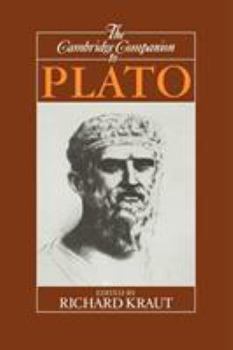The Cambridge Companion to Plato
(Part of the Cambridge Companions to Philosophy Series)
Select Format
Select Condition 
Book Overview
Plato stands as the fount of our philosophical tradition, being the first Western thinker to produce a body of writing that touches upon a wide range of topics still discussed by philosophers today.... This description may be from another edition of this product.
Format:Paperback
Language:English
ISBN:0521436109
ISBN13:9780521436106
Release Date:October 1992
Publisher:Cambridge University Press
Length:578 Pages
Weight:1.67 lbs.
Dimensions:1.4" x 6.0" x 8.9"
Customer Reviews
5 ratings
Very Good
Published by Thriftbooks.com User , 18 years ago
This is a very good overview of Plato's philosophy. I would recommend this volume for those that want to learn of his philosophy without reading that acual works.
(no title)
Published by Thriftbooks.com User , 18 years ago
I cannot recommend this volume highly enough. It's a collection of essays, all (bar one) especially written for this volume, each of them authored by a leading scholar on the respective dialogue or topic. Especially the pieces by Frede and Fine constitute path-breaking, durable contributions to Plato scholarship; each of them would merit the purchase by itself. Between them, Frede and Fine also introduce the reader to two rather different approaches to interpreting Plato, and at once present these approaches at their very best. Some essays are naturally harder than others, ranging from the instantly accessible to the rather technical. This is as it should be: a reader's companion to Plato's dialogues which themselves vary from the easy to the 'forbidding'. And a book that won't become redundant as your own competence with the dialogues grows (who ever said it won't?). To conclude: these pieces range from the good to the outstanding, none of them is harder than it should be, and they display considerable diversity in methodology. PS People interested in the 'non-doctrinal' approach to reading Plato may profitably consult Ferrari's piece at http://ccat.sas.upenn.edu/bmcr/2000/2000-11-10.html, and the "Introduction" (pt.III-IV) in John Cooper, "Plato: Complete Works" (Hackett 1997).
A Very Good Introduction to Plato
Published by Thriftbooks.com User , 23 years ago
The Cambridge Companion to Plato is an extrememly good primer of Plato's philosophy. The book begins with a complete overview of Plato's philosophy and how it progressed through time. This overview is particularly helpful for those who have never studied Plato before and essential for those who use this book, as I did, as their first exposure to the study of philosophy.Like all books in the Cambridge series, the Companion to Plato consists of a number of essays written by preminent scholars. These essays explain and evaluate various aspects of Plato's philosophy, from "the defense of justice in Plato's Republic" to "mathematical method and philosophical truth."Like any philosophy textbook, The Cambridge Companion to Plato can, at times, be dense. I won't recommend it for everbody; a hearty interest in learning philosophy is definately required. However, I've found it to be one of the finest introductions to Plato in his philosophy. It provides a good foundation for actual reading of Plato's texts, which is the next logical step beyond this book. It is also perfect for those who wish to gain a working understanding of Plato's view of the world but, like me, simply do not have the patience to garner it from Plato's own work.
A comprehensive introduction to Plato
Published by Thriftbooks.com User , 23 years ago
This collection of essays written by a host of outstanding scholars of ancient philosophy in this generation may well serve as a comprehensive and dense guideline to the philosophy of Plato and the contemporary viewpoints concerning the arguments presented by Plato. I am especially impressed by the excellent introduction written by the editor of this book, Richard Kraut. It is so well-organized, sharply presented and teemed with useful materials that I find it to be the best short introduction on Plato I ever read. And the structure of the whole book is also well balanced that the essays of which it is composed nearly touch every controverisal problems concerning Plato's philosophy and that those problems are all more or less treated in a appreciable way.
Is Justice always good?
Published by Thriftbooks.com User , 23 years ago
In Plato's , he justify the idea of goodness. His dialetic speech is so tight and logic that everybody in this dialogue agree his opinion(doxa). Plato has willing to persue the episteme(truth knowledge, not doxa), and this will be connects the idea of goodness. This book has 15 essays on Plato's philosophy. and every article has their themes; for example . Readers can get the better orthodox toward Plato's philosophy with this book.




